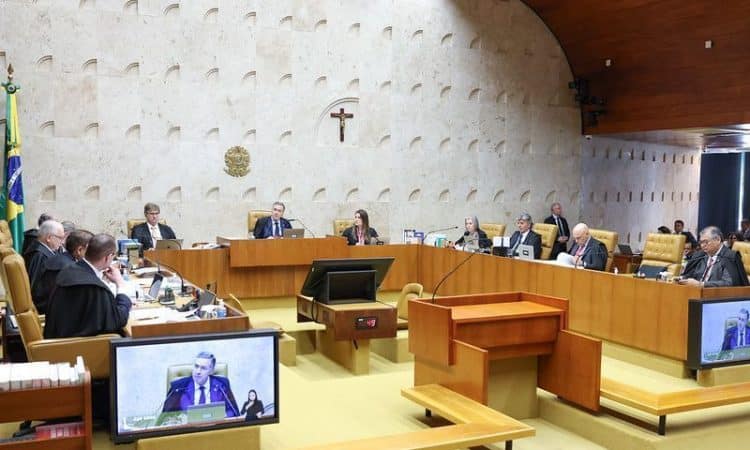
The Federal Supreme Court (STF) will continue to analyze, on Thursday (12), an appeal that discusses the possibility of immediate execution of the prison sentence after conviction by the jury court, also known as a popular jury.
The discussion, which had been on hold since , was restarted this Wednesday (11). So far, the rapporteur, Luís Roberto Barroso, and minister Gilmar Mendes have voted.
Votes
So far, there is a provisional score of three to one against the possibility of immediate execution of the sentence after conviction by the jury.
Barroso voted in favor of the immediate execution of the conviction, regardless of the total sentence imposed.
Gilmar voted that the execution would not be possible after the jury’s decision, and must wait for the resources to be exhausted. He understood, however, that pre-trial detention of the convicted person may be ordered, as long as it is “motivated” and analyzed on a case-by-case basis.
Rosa Weber and Ricardo Lewandowski (both retired) followed Gilmar’s vote. Their votes are preserved.
Discussion
The case has widespread repercussions. What is decided will apply to all instances of Justice.
The jury court is responsible for judging intentional crimes against life, such as homicide and feminicide. It is made up of jurors, who are citizens selected at random to participate in the trial.
The Constitution establishes that the jury’s decisions are sovereign. However, it is possible to file an appeal in specific situations, such as in the case of an error in the application of the sentence or when the jury’s decision is “manifestly contrary to the evidence in the case”. In these situations, the court may order a new jury.
From virtual to physical
Gilmar was responsible for sending the case for trial in the physical plenary of the Court, when there is debate between the ministers. Between 2020 and 2023, the topic was analyzed in virtual sessions.
There was already a majority formed by the understanding that it is possible to immediately serve the sentence, after conviction by the jury.
As the case was referred to a , the votes are reset and the discussion begins again.
Virtual plenary
The analysis of the topic had 9 votes presented in the virtual plenary.
On that occasion, they voted in favor of the possibility of immediate execution of the conviction of the popular jury Barroso, and ministers Dias Toffoli, Alexandre de Moraes, Cármen Lúcia, André Mendonça and Edson Fachin.
Fachin presented a third position. For him, immediate imprisonment is possible only in cases of conviction to sentences above 15 years, as established by law.
Gilmar Mendes, Ricardo Lewandowski and Rosa Weber understood that it was not possible to execute the conviction after the jury’s decision.
Relator
Barroso maintained this Wednesday (11) the vote given in a virtual session. For the magistrate, the immediate execution of the sentence imposed by the Jury Court “does not violate the principle of presumption of innocence” nor does it contradict precedents set by the STF.
“The presumption of innocence is a principle (and not a rule) and, as such, can be applied with greater or lesser intensity, when considered with other principles or conflicting constitutional legal interests”, he stated.
“Furthermore, it is not denying the possibility of lodging an appeal to the convicted person, but merely establishing that the decision given by the Jury Court is immediately enforceable.”
The minister also said that the basis for authorizing the immediate execution of the conviction “is not in the amount of the penalty applied by the respective presiding judge”, but in the sovereignty “conferred to the verdicts of the popular Court, by the express will of the original text of the Constitution”.
He proposed establishing the following judgment thesis: “The sovereignty of the Jury Court’s verdicts authorizes the immediate execution of the conviction imposed by the jury, regardless of the total penalty imposed”.
Divergence
Gilmar also maintained his previously presented vote. He argued that the presumption of innocence and the constitutional principle that “no one will be considered guilty until the final criminal sentence has been finalized” must be respected.
According to the minister, this principle cannot be considered “considerable”, but rather a “precise rule”. Gilmar also said that the “sovereignty of verdicts is not absolute”.
Specific case
The process that was chosen to formulate the thesis in the Supreme Court came from Santa Catarina. This is an appeal by the state Public Prosecutor’s Office against a decision by the Superior Court of Justice (STJ) that invalidated the arrest of a person convicted by the jury for qualified femicide and illegal possession of a firearm.
The STJ understood at the time that the immediate execution of the sentence could not be determined before exhausting the resources and without confirmation of the conviction by the court of second instance.
The Chapecó (SC) jury had sentenced a man to 26 years and 8 months in prison for killing his ex-partner.
According to the process, the crime was committed because he was unable to accept the end of the relationship and with the aim of having custody of the couple’s only daughter.
After the conviction, the presiding judge of the jury court denied the defendant the right to appeal in freedom.

